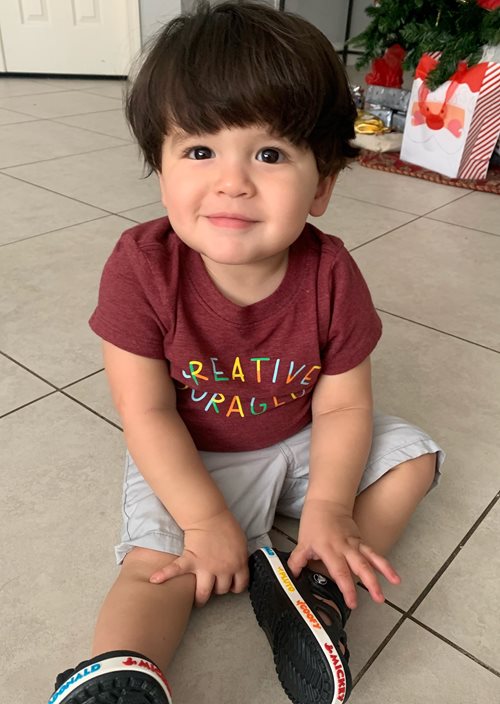Erika and Armando know they are immensely fortunate that their firstborn was transferred to Nicklaus Children’s Hospital soon after his birth. Thanks to the care received, baby Cassian will likely avoid the ravages of a typically silent genetic disorder that eventually could rob him of liver function.
Soon after his October 2020 birth in Boca Raton, Cassian experienced persistent pulmonary hypertension. Doctors transferred the critically ill newborn to Nicklaus Children’s Pediatric Intensive Care Unit to learn if there was a genetic reason for his illness.
Based on the persistent pulmonary symptoms, Cassian, at just two and a half weeks old, was a candidate for rapid whole genome sequencing (rWGS). Nicklaus Children’s is one of only two hospitals in Florida offering rWGS. Learn more about the hospital’s research and work to make WGS the standard of care for children with undiagnosed illnesses.
Cassian’s rWGS results were life altering. He was diagnosed with Wilson’s disease, a genetic disorder that can have devastating consequences if not managed effectively. Most families are unaware that a child has the disorder until later in childhood when liver function is permanently impaired.
Given the very early diagnosis, Cassian likely will never experience the severe consequences associated with Wilson’s disease. Based on guidance from the clinical team at Nicklaus, Erika and Armando are carefully managing Cassian’s diet to avoid foods high in copper (among them chocolate, nuts and shellfish) that will help him avoid liver disease. They regularly see a gastroenterologist at Nicklaus Children’s Hospital, to monitor Cassian’s copper levels.
Through genetic testing provided separately at Nicklaus, Erika and Armando have discovered that they are both carriers of Wilson’s disease. They encouraged their adult relatives of childbearing age to pursue testing to find out if there were other carriers within the family. This eventually led to the Wilson’s disease diagnosis of another young child within the extended family. This early discovery will ensure that this child, too, can avoid the associated liver problems.
“Our family is so fortunate to benefit from rapid whole genome sequencing at Nicklaus Children’s. It brought to light a disease that could have devastating impact on Cassian in the years ahead. Today, he is a perfectly healthy little boy who recently celebrated his first birthday. It is our hope that rapid whole genome sequencing becomes the future standard of care for every critically ill child with an undiagnosed illness,” said Erika.
